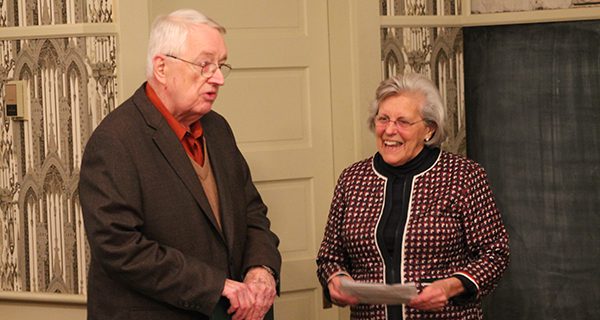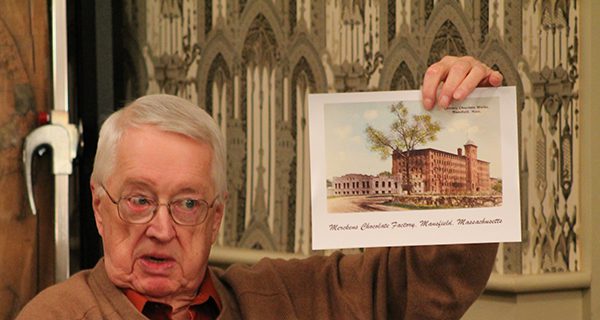[ccfic caption-text format="plaintext"]
By James Kinneen
Hometown Weekly Reporter
When you think about Massachusetts industries, odds are that seafood, higher education or some form of finance are going to come to mind well before confectionery or candy will. But on Tuesday night, John Pritchard taught a room of people how prevalent the industry once was in the state.
Before he began his presentation, Pritchard was given the Westwood Historical Society’s Quarter Century Award for his twenty-five years of service. Pritchard has held a wide variety of roles in Westwood, from Scouting and pastoral work to the spelling bee and academic decathlon. The Historical Society noted they were especially thankful for his efforts inputting their collections into the computer.
Pritchard wanted to give an overview of the history of chocolate, then weave Massachusetts’ role into the presentation at the appropriate chronological point. Right off the bat, Pritchard provided some interesting information people likely hadn’t heard about before. While the idea that the Aztecs were the first to use chocolate has been long believed, recent discoveries of cacao residue in vessels has meant chocolate usage actually dates to 450 BC. Still, the Aztecs did use cacao as a drink served with chili peppers - but it was reserved for the elite (according to Pritchard you needed Montezuma’s permission). Chocolate remained a drink for a long time, served with a foam on top created by transferring it from cup to cup.
“I’ve tried it. It took a long time” Pritchard noted. “And it didn’t taste like Frappuccino.”
One of the most interesting things about Pritchard’s presentation was that he had an array of props in front of him to help illustrate his point. So, if Pritchard was talking about what a cacao bean looked like and how it’s processed, he had a real one to use as an illustration. At the end of the presentation, the crowd came up to touch the various items he had, as well as to ask any questions about them.

Co-president of the Westwood Historical Society Lura Provost presents John Pritchard the Quarter Century Award.
“I can’t tell you how, since they made me sign a piece of paper,” he explained, “but I can make an Oreo in my kitchen.”
Pritchard noted that Cambridge had many confectionary companies, including NECCO, which caused a mini panic when they were forced to stop production of their Valentine’s hearts. And while he noted there have been many other Massachusetts companies that made candy - like Fanny Farmer, Brigham’s, Bailey’s, and Schrafft’s in Charlestown - it was clear the Walter Baker Chocolate Factory in Dorchester Lower Mills was the one people wanted to know about.
While still in business, Pritchard noted that since moving to Dover, Delaware in the sixties, he suspects they aren’t making chocolate anymore, but “private labeling,” - essentially putting their name on something another company actually created. However, the remnants of the company are all over Boston. For example, after Pritchard talked about how the company’s famed logo, “The Chocolate Lady,” came from a painting by Swiss painter Jean-Étienne Liotard, a woman in the audience said that her mom worked for the company and used to get dressed up as the image to visit local supermarkets (and for the Dorchester Day parade).
At the end of his presentation, Pritchard fielded a few questions. After whether or not chocolate was healthy was brought up, Pritchard noted that dark chocolate is considered better for you than milk chocolate, before relaying a story about one of his brushes with the media. In an article for the Boston Herald, Pritchard was quoted as saying that chocolate has been found to prevent plaque buildup in your arteries. Horrified, he called the editor and made them issue a retraction.
Pritchard did say that chocolate has been proven to reduce plaque buildup, but he didn’t say in your arteries - he said on your teeth.






















